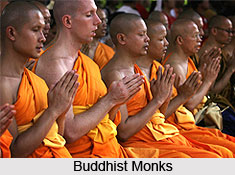 Dasa Dandu is the ten prohibitions which are enjoined upon the Buddhist monks to be studied during their noviciate.
Dasa Dandu is the ten prohibitions which are enjoined upon the Buddhist monks to be studied during their noviciate.
These Dasa Dandu are described in the following way-
•One should not eat food after mid-day
•The Buddhists monks should not watch dances or listen to music or songs.
•Ornaments or perfumes cannot be used.
•They cannot use a seat or couch more than a cubit high.
•These monks should not receive gold, silver, or money.
•One cannot deceive to prevent another priest from receiving that to which he is entitled.
•The monk cannot practice any deception to injure another priest or bring him into danger.
•As per the Dasa Dandu, one monk should avoid practicing some deception in order to cause another priest to be expelled from the community
•Dasa Dandu does not allow speaking evil of another priest
•Uttering slanders, in order to excite dissension among the priests of the same community is prohibited by Dasa Dandu.
The first five of these crimes may be forgiven, if the priest bring sand and sprinkle it in the court-yard of the vihara and the second five may be forgiven after temporary expulsion.




















